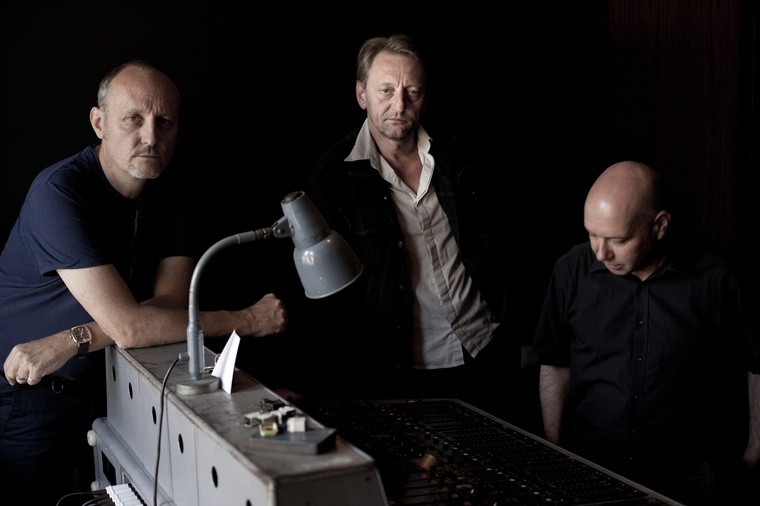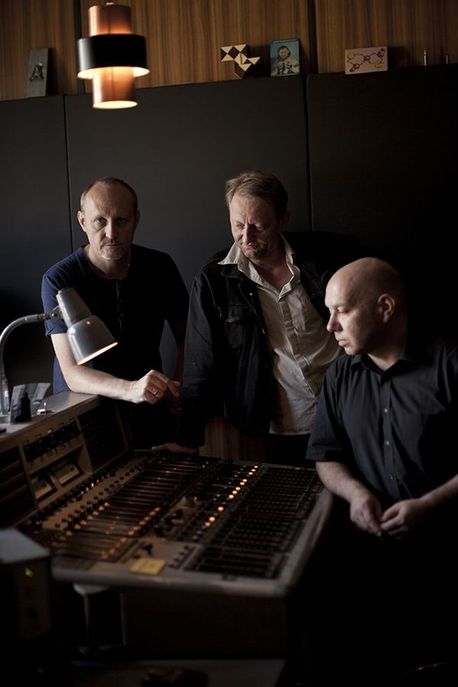Dragoș: How did you come up with the name Automat?
Jochen Arbeit: Research. Because nowadays, every name you can possible imagine already exists.
Dragoș: Even Automat. I found an italo/space disco project from the ‘70s, and some project from France.
Jochen Arbeit: We even got invited to play for a gig, but it was a confusion, they wanted someone else actually. And the promoters were like ‘oh, there’s so much money you want for only one person, for one guy? We can not do this.‘ But it was the other guy. The problem is all the names are gone, probably, so we have to find one, which is still working, so we used a lot the Internet to find out. In the old days, you could choose a name and that was it, you know? But now, everything is gone, because you do research, you find somebody in Australia with that name, so what you do? So yes, choosing the name took us a long time, at least a year. Many sleepless nights, drinking, many nights.
Zeitblom: The first show was without a name.
Jochen Arbeit: Oh yes. So it’s getting more and more complicated to find a name, because everything is gone, taken.
Zeitblom: I think it’s the perfect name for our band, because it has to do a lot with the music. We are playing like a machine; we are the robots (all laughing)
Jochen Arbeit: Sometimes.
Andrei: Regarding the rich music background that all of you have, what brought you together in this formula?
Jochen Arbeit: I insist on at least 30 years of studio experience, otherwise I don’t play with people anymore. So I know these guys have 30 years; each of us has 30 years studio experience.
Zeitblom: 29. (
laughing)
Jochen Arbeit: So it is a good feeling in the studio.
Zeitblom: Yes, you don’t have to talk about…things. Just set up and play. It’s very easy. No discussion.
Dragoș: But you know each other for… ?
Jochen Arbeit: 4, 5 years… Not so long..
Zeitblom: We just met right before we started playing.
Jochen Arbeit:I brought them together. Mafia style (
laughing)
Dragoș: Were you aware of the music projects each one of you was involved in?
Jochen Arbeit: More or less. It’s more important to know the taste of the people, not what they do or in which bands they play. This is not so important, but to know the individual and personal taste of everybody, this is important. And then you can say, ‘oh yeah, I know what he likes, maybe this fits.’
Dragoș: Yes, but to know the taste, you must know the person.
Jochen Arbeit: Oh yes, definitely. You have to be personal.
Zeitblom: We have a lot of taste that we just crossed, what we meet.
Jochen Arbeit: We grew up on the same things. We have a common musical universe.
Achim: 35 years ago, we had the same records.
Dragoș: Sound wise, the album is a combination of dub, experimental and other suff. Can we still call it a dance album?
Jochen Arbeit: If you want. It’s danceable, yes.
Dragoș: Does it have any certain purpose?
Jochen Arbeit: People to enjoy it, of course.
Zeitblom: We are happy when people are dancing and having a good time.
Jochen Arbeit: Yes. It’s very simple actually. I come from a background where I did, for many years, a lot of improvised concerts, without drums and grooves, so I said at some point that a bit of grooves and a bit of drums would be good. So I had a face without, and now I have a face very groovy, so it’s like this. And I like it a lot. Because I was missing, I was missing the groove.
Andrei: Tell us a little bit about the EP released with Kreidler.
Jochen Arbeit: The record company asked us to do some songs. It was the Record Store Day, I never heard about it before, it was new to me. We recorded some songs and it just happened.
Dragoș: I’ve heard that
Einstürzende Neubauten is planning to release a new album.
Jochen Arbeit: Yes, soon. Pretty soon. But I don’t want to talk about this, let’s talk about Automat.
Meanwhile I found out that the new album from Einstürzende Neubauten is called ‘’Lament’’ and features 14 tracks. The album version of LAMENT should be heard as a studio reconstruction of a work primarily designed to be performed live, rather than an official new Einstürzende Neubauten LP proper. More on the official website.


